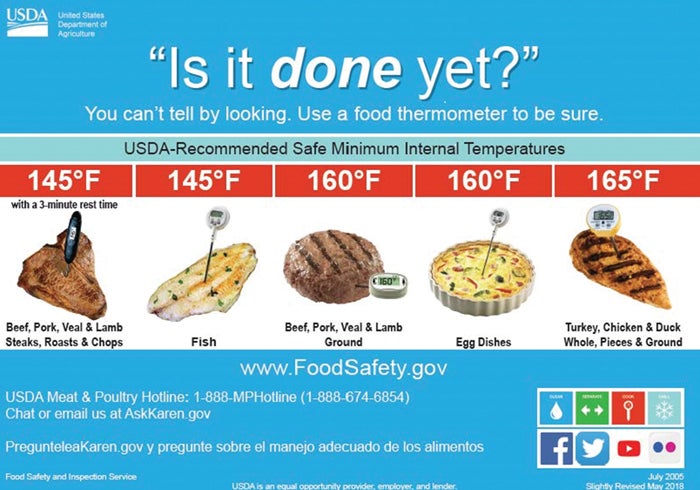Be food safe and avoid getting sick
Published 12:00 am Friday, September 6, 2019
By Toi Degree
Rowan Cooperative Extension
Practicing proper food safety is the single most important thing that can be done to reduce the number of foodborne illness cases reported yearly.
Every year, an estimated one in six Americans (48 million people) get sick, 128,000 are hospitalized, and 3,000 die from eating contaminated food. Anyone can get sick from a foodborne illness, which is often called food poisoning.
But there are some groups of people more likely to get sick and have a more serious illness. These groups are:
- Children younger than 5 years of age;
- Adults aged 65 and older;
- People with weakened immune systems from medical conditions or their treatment, such as cancer, HIV/AIDS, or diabetes;
- Pregnant women.
Children younger than 5
Children younger than 5 years old are at an increased risk for foodborne illness and related health complications because their immune systems are still developing. Young children with developing immune systems cannot fight off infections as well as adults can. In addition, young children produce less stomach acid that kills harmful bacteria, making it easier for them to get sick.
Food poisoning can be particularly dangerous for young children because food poisoning often causes vomiting or diarrhea or both. Since children’s bodies are small, they can quickly lose a lot of body fluid, causing dehydration.
Children younger than 5 are three times more likely to be hospitalized if they are diagnosed with salmonella. Kidney failure strikes one out of seven children under age 5 who are diagnosed with E. coli O157 infection.
Older adults
Older adults have a higher risk because as people age, their immune systems and organs do not recognize and get rid of harmful germs as well as they once did.
- The gastrointestinal tract holds onto food for a longer period of time, which allows bacteria to grow.
- The liver and kidneys may not properly rid the body of foreign bacteria and toxins.
- The stomach may not produce enough acid. The acidity helps to reduce the number of bacteria in our intestinal tract.
- Underlying chronic conditions, such as diabetes and cancer, may also increase a person’s risk of foodborne illness.
All these things contribute to nearly half of people aged 65 and older who have a lab-confirmed foodborne illness from salmonella, campylobacter, listeria or E. coli being hospitalized.
Compromised immune systems
A properly functioning immune system works to clear infections and other foreign agents from the body. People with weakened immune systems are more likely to have a lengthier illnesses, undergo hospitalization or even die should they get a foodborne illness. Those who are on dialysis are 50 times more likely to get a listeria infection.
Pregnant women
The immune system changes in pregnant women which place them, their unborn children, and their newborns at increased risk of foodborne illness. These illnesses can be worse during pregnancy and may lead to miscarriage or premature delivery.
Some foodborne illnesses, such as listeria and toxoplasma gondii, can infect the fetus even if the mother does not feel sick. This is why doctors provide pregnant women with specific guidelines about foods that they should and should not eat. For a more detailed list of the guidelines, visit: https://www.foodsafety.gov/people-at-risk/pregnant-women
There are things you can do to protect yourself and your family. As you prepare and handle food, follow these four steps:
Clean: Wash hands, utensils and surfaces often. Germs can spread and survive in many places.
Separate: Raw meat, poultry, seafood and eggs can spread illness-causing bacteria to ready-to-eat foods, so keep them separate.
Cook: Food is safely cooked only when the internal temperature is high enough to kill germs that can make you sick.
Chill: Refrigerate promptly. Bacteria that cause food poisoning multiply quickest between 40 degrees and 140 degrees.
Join us in sharing information about the four steps to food safety. Let’s make sure everyone knows how to protect themselves and their loved ones from food poisoning.
For information about foodborne illness and fact sheet visit the Center for Disease Control website: https://www.cdc.gov/features/food-safety-smarts/index.html
Toi N. Degree is the family and consumer education agent with North Carolina Cooperative Extension. Call 704-216-8970 or email toi_degree@ncsu.edu.



